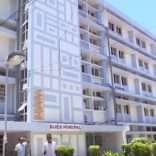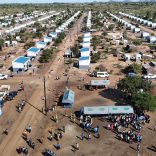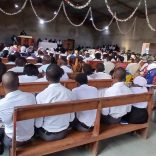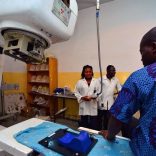WHO to donate about 3.5 million doses of cholera vaccine to Mozambique
Cabo Delgado: “There are two levels of security”

João Feijó: "In the town of Mocímboa da Praia, there is still a lot of fear of insecurity"
- More than a year after the attack that resulted in the withdrawal of Total from Mozambique, there are still no signs of the French giant’s return. A Mozambican researcher says that security has improved, especially around the gas project, but fears also linger.
TotalEnergies suspended its €20 billion natural gas production project in Palma district, northern Mozambique, in March, 2021, after an armed attack on the town. It was within the scope of this project that a new city and industrial complex were being built to exploit the natural gas reserves of the Rovuma Basin.
More than a year after the attack, there are still no signs of the French giant’s return. In an interview with DW, researcher João Feijó, from the Observatório do Meio Rural (OMR), explains that the situation on the ground has changed, but security remains a priority in the region.
Feijó says, however, that “security is not the same” everywhere in the province.
DW Africa: Is the return of the French multinational TotalEnergies to Mozambique still a mirage?
João Feijó (JF): There are important changes. A year ago, there was a physical occupation of a large part of the territory – including several district headquarter villages, but above all of Mocímboa da Praia. Today we clearly have more security on the ground. Reconstruction is starting to be envisaged, and there is already more military stability. In recent months, the incidence of attacks has decreased. We are already beginning to see timid movements of the populations returning. So this is not exactly a mirage. It’s already starting to take some shape.
DW Africa: In your opinion, what has the government done to ensure the return of TotalEnergies to Mozambique?
JF: The government is a very fragile entity. It does not have the capacity to implement measures in this direction on its own. It has clearly had the support of international military forces, which are guaranteeing security, and also of the World Bank, to recover the infrastructures where the state will later be able to operate, providing services and supporting economic activities that are indirectly complementary to TotalEnergies. But for now, the focus has been on security.
DW Africa: Is there a risk of a setback and a return of armed attacks?
JF: The population could be an easy target for them if they re-establish their logistics. Robbing and kidnapping the population, continuing the conflict. The situation continues to be tense, but it’s not like it was a year ago.
DW Africa: But right now, what is needed for TotalEnergies to return to Mozambique?
JF: In first place, security, because even though things are getting better, it’s still not 100% safe. In Mocímboa da Praia [town], one of the strategic locations which has to be safe for TotalEnergies to return, there is still a lot of fear of insecurity.
DW Africa: TotalEnergies CEO Patrick Pouyanné said the company will only resume operations in northern Mozambique when people are safe. Are there safety conditions for the company’s return? On Tuesday the Minister of National Defence, Cristóvão Artur Chume, said that the situation in Cabo Delgado was “much more stable”.
JF: We have to see who the speech is for. The government speaks with two voices, depending on who it is addressing. There is an optimistic point of view, which is normally addressed to TotalEnergies, showing that the government is confident and that the situation is on track for Total’s return. But then there is another version addressed to the population, according to which they must wait [to return].
DW Africa: Do we run the risk of having security at two speeds: one for the gas projects and another for the rest of the province?
JF: We don’t run the risk – it’s already a reality, because in Palma and Mocímboa there is no record of great violence. This violence takes place outside the Afungi-Palma-Mocímboa triangle. An enclave economy is being consolidated there, in which the gas business is more protected. But on the periphery, where there are no major extractive economic interests, security is not the same. So there are two levels of security and two levels of priorities, naturally.
CAPTION – Attacks in northern Mozambique have displaced thousands
DW Africa: On this gas project, the memorandum of understanding with the Government provides for the training of 2,500 young people with the support of TotalEnergies. Is it credible that this will happen?
JF: It’s credible. Two thousand five hundred young people may seem like a very high number, but if we consider that there are 750,000 displaced people, 2,500 young people is a very small number.
DW Africa: If it goes ahead, will this project take into account the interests of local communities?
JF: The feature of the gas project which has the greatest capacity to stoke pressure and lobbying is that it involves millions in revenue for the Mozambican state – which will reinforce the State Budget, and will later enable the execution of many projects and the distribution of resources.
The population is disorganised, dispersed, in the bush, far from the media, the embassies and the development agencies. It is not organised and cannot form a pressure group capable of demanding public policies that favour it. In the medium term, when gas revenues start to come in, they will be able to benefit. But as long as they are not an organised group capable of exerting pressure and lobbying, they will always be side-lined in the sharing of benefits.
Source: Deutsche Welle












Leave a Reply
Be the First to Comment!
You must be logged in to post a comment.
You must be logged in to post a comment.